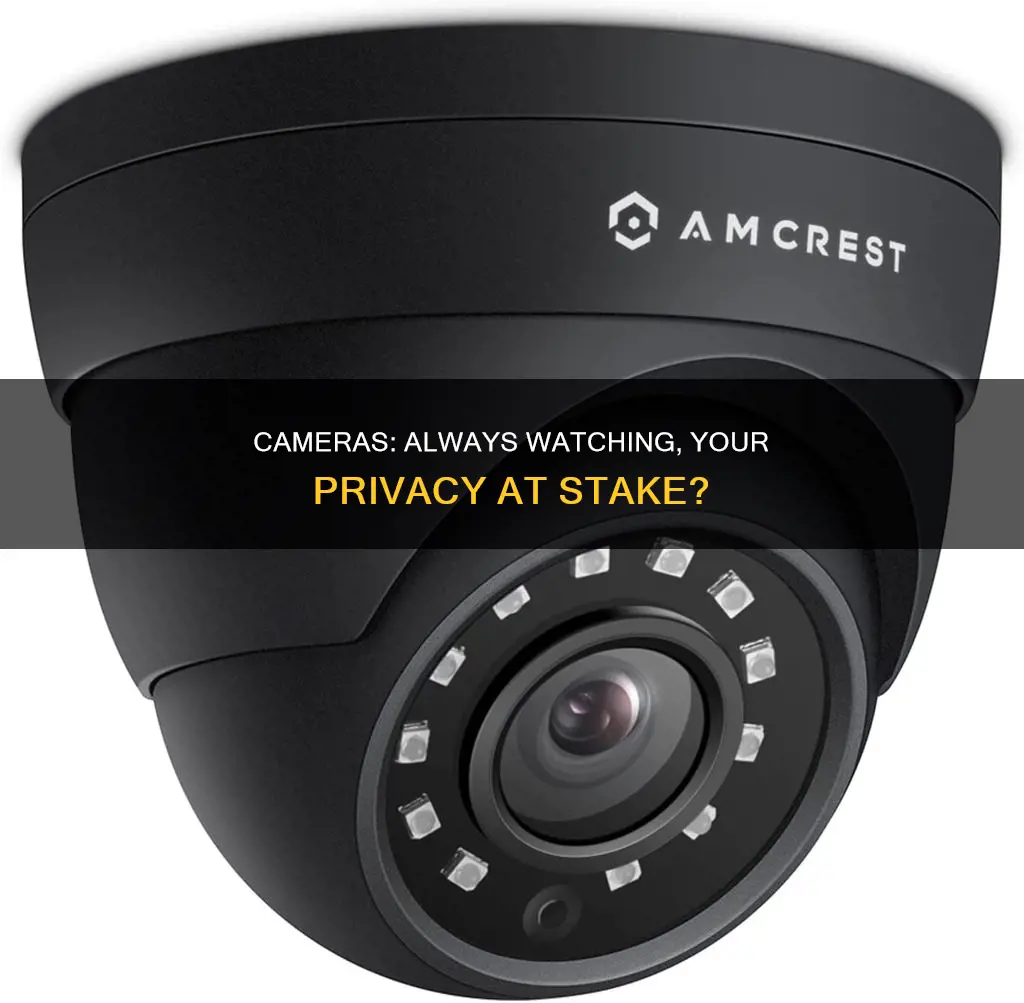
In today's world, where video chatting and social media live streaming are prevalent, it is crucial to be aware of the potential risks associated with our webcams and phone cameras. Unsecured cameras can provide malicious hackers with a direct window into our lives, allowing them to spy on us and the people around us without our knowledge. While it may seem like something out of a Hollywood movie, criminals can and do record video footage to extort money from their victims. This type of cyberattack, known as camhacking, is a serious threat to our privacy and security.
The good news is that there are ways to detect and prevent camhacking. By being vigilant and adopting security-minded habits, we can protect ourselves from becoming victims of this insidious crime.
| Characteristics | Values |
|---|---|
| Data usage | Higher than usual |
| Camera behaviour | Turns on by itself, runs slowly and crashes frequently |
| Camera permissions | Illegitimate apps have access to the camera |
| Video call performance | Poor despite a good connection |
| Call sounds | Strange sounds such as a camera shutter, static, clicking or echoes |
| Location permissions | Apps have access to location data |
| Camera light indicator | Light is on or blinking when the camera is not in use |
| Apps, photos or videos | Unfamiliar apps, photos or videos appear |
| Battery performance | Battery drains quickly |
| Device temperature | Device heats up more than usual |
What You'll Learn

Strange camera activity
- Your phone camera turns on by itself, indicating that it is in use when it shouldn't be.
- You receive an error message saying your camera is already in use when you try to take a picture or join a video call.
- You find photos or videos on your device that you don't remember capturing.
- Your camera runs slowly and the app frequently crashes.
- Third-party camera apps open on their own.
- Your camera's indicator light turns on unexpectedly or remains on even after you exit apps that use your camera.
It's important to note that software glitches and faulty hardware can sometimes produce similar symptoms, so further investigation is necessary to determine if your camera has been compromised.
Watching Surveillance Station Cameras on Your TV
You may want to see also

Background app activity
Low-level spyware often appears as an app running in the background. More sophisticated spyware may not show up so easily. However, if you check your phone's background app activity, you may still notice unfamiliar apps or suspicious activity. To do this, go into your battery usage or screen time settings to check which apps are most active on your device. If an app you haven't been using shows high and recent activity, it could be hosting spyware, and you should get rid of it.
It's important to note that location services, Bluetooth, and background apps can also drain your battery, so be sure to rule out other causes before jumping to conclusions. Additionally, skilled hackers can use your camera without triggering the camera indicator light, so the absence of this sign doesn't necessarily mean your device is spyware-free.
Another sign of spyware is excessive data usage. Spyware silently gathers and uploads your data without your knowledge or consent, causing an abnormal surge in your data consumption. If your browsing habits stay the same but your data usage has increased, it could indicate spyware infection. However, if the spyware is well-hidden, you may not be able to see where the data usage is coming from.
Watching Your Camera Feed Remotely: A Step-by-Step Guide
You may want to see also

Excessive data usage
If you suspect someone is spying on you through your phone camera, there are several signs that may indicate excessive data usage.
Firstly, if you notice an abnormal surge in your data consumption, it could be a red flag for spyware. Spyware silently gathers and uploads your data without your consent, leading to increased data usage. However, it's important to compare your actual data usage with your phone's data usage breakdown to identify any discrepancies.
Secondly, some spyware may appear as an open application running in the background. While more advanced spyware won't be so easily detectable, checking your background app activity can help identify suspicious apps or activities. Go to your battery usage or screen time settings to check which apps are most active. If you notice an app you haven't been using with high recent activity, it could indicate spyware.
Additionally, spyware requires a lot of processing power, which can cause your phone to heat up more than usual, even when idle. This is another sign to look out for, especially if your phone is hot when you pick it up or you receive a warning about overheating.
Furthermore, recording video consumes a lot of resources, and frequent filming can quickly drain your battery. If your phone is losing charge faster than expected, it could be a sign that someone is hacking your camera.
Finally, if you receive a "low storage space" warning or notice that your storage is full without a clear reason, it could indicate the presence of spyware or malicious files. It's important to regularly monitor your storage to identify any strange activity.
While these signs may indicate excessive data usage due to potential spyware, it's always a good idea to practice good cyber hygiene, such as regularly updating your software, removing old files and apps, and using strong passwords.
Springwatch Live Cameras: How to Watch
You may want to see also

Unfamiliar apps or files
Cybercriminals can also hijack your connection and install malware that way—this is known as a Man-in-the-Middle (MiTM) attack. MiTM attacks are more common on public Wi-Fi networks and websites with poor security.
You can regularly check your downloads folder for anything that shouldn't be there. Spyware also affects your storage availability, and you might notice your storage is full when it shouldn't be. It's a good idea to monitor your storage regularly so you'll notice strange activity as soon as it happens.
Frankfurt Brothels: Are They Under Surveillance?
You may want to see also

Strange storage files
- Unfamiliar files and apps: Cybercriminals often use unsecured or infected apps to install malware on your device. If someone has access to your phone, they can download malicious apps. Keep an eye on your downloads folder and monitor your storage regularly to catch any strange activity early on.
- Strange camera activity: If your phone camera turns on by itself, it means it's in use when it shouldn't be. You might also find photos or videos that you don't remember taking. While this could be due to faulty hardware or software problems, it could also indicate spyware. Update and restart your phone and apps to see if the issue persists.
- Background app activity: Low-level spyware may appear as an app running in the background. More sophisticated spyware won't be so obvious. Check your battery usage or screen time settings to identify which apps are most active on your device. If an app you haven't used recently shows high activity, it could be a sign of spyware.
- Excessive data usage: Spyware silently gathers and uploads your data without your consent, leading to a surge in data consumption. Compare your data usage with your actual usage patterns and check which apps are using the most data. If spyware is well-hidden, you might not be able to identify the source of the data usage.
- Messages or emails you didn't send: Spyware can record and upload images and videos in various ways. Some stream media files directly to a cloud server, while others might send them via your messaging apps or email. Keep an eye out for any messages or emails you didn't send or deleted messages you don't remember deleting.
Watching Live Camera Feeds: A Step-by-Step Guide
You may want to see also
Frequently asked questions
If the LED light next to your camera is on even when it's not in use, it could be a sign that your camera has been hacked. Other signs include strange camera behaviour, such as turning on by itself, and the appearance of unfamiliar apps or files.
It is recommended to cover your webcam when not in use, either with a sticker or a sliding webcam cover. In addition, regularly updating your devices, using strong passwords, avoiding suspicious links, and installing security software can help prevent webcam hacking.
Webcam hacking can lead to a serious breach of privacy. Hackers can record video footage or take control of your computer to access personal information. They may then use this information for blackmail or other malicious purposes.
Cybercriminals, stalkers, and even governments have been known to spy on individuals through their cameras. In some cases, it may be a jealous ex-partner or a random hacker trying to obtain valuable information.
Spyware is a type of malware that allows hackers to control your phone's camera and microphone, as well as access your data and apps. It can be installed through insecure apps, infected links, or unencrypted Wi-Fi connections. Spyware can record and upload data without your knowledge, leading to increased data usage.







